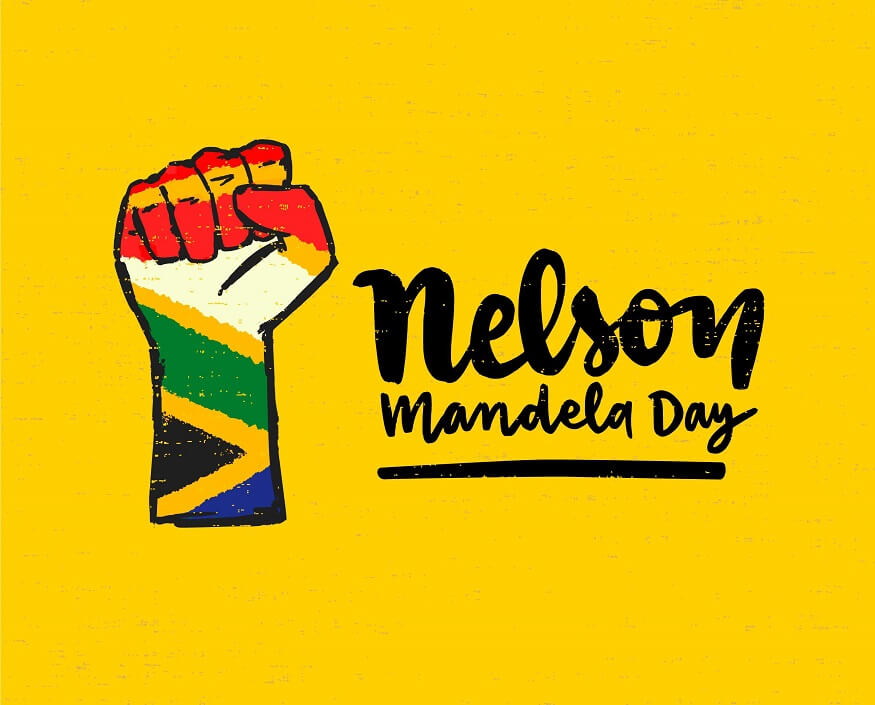Nelson Mandela International Day is celebrated in honour of Nelson Mandela, every year on 18th July, his birthday. The United Nations (UN) officially declared the Nelson Mandela International Day in 2009, which has been celebrated yearly since. Mandela Day is not just meant to be a public holiday for celebration, but a day to honour the legacy of Nelson Mandela and his values through volunteering and community service. This day urges all global citizens to follow the example of Nelson Mandela and celebrate the power that each of us has to make an impact and transform the world we live in. The campaign for Mandela Day 2022 highlighted the critical issues of food security and climate change with the tagline: “Do what you can, with what you have, where you are.” Some of the past campaigns have focused on messages urging people to come forward for social justice, such as: “Nelson Mandela has fought for social justice for 67 years. We’re asking you to start with 67 minutes.”
Here are some of the things one must know about Nelson Mandela
Nelson Mandela (18 July 1918 – 5 December 2013) was and still is. one of the most inspirational personalities that lived on this earth. He led the crusade against apartheid globally and served as the first president of South Africa (1994-1999). He was also the first black president of South Africa and was also the first fully democratically elected president of South Africa. He also served as the president of the African National Congress from 1991 to 1997. This year (2023) marks 10 years of his passing in December 2013.
Nelson Mandela’s Early Life
Nelson Mandela was born on 18th July 1918 in the Thembu royal family in Mvezo, Union of South Africa. The Union of South Africa is the historical predecessor of the present-day Republic of South Africa. He was a lawyer by profession and practised as a lawyer in Johannesburg as one of South Africa’s first black lawyers. He completed his law education at the University of Fort (Eastern Cape) Hare and the University of Witwatersrand (Johannesburg).
Political Activism
Nelson Mandela joined the African National Congress (ANC) in 1943 and co-founded its youth league in 1944, thus becoming an anti-colonial activist. The Nationalist Party then formed a white minority government and introduced the apartheid rule. This is when Mandela and the ANC took a vow to overthrow the Nationalist Party’s rule and to fight against racial discrimination and apartheid. Unlike MK Gandhi, who followed a regime of non-violence, Mandela was convinced that an armed struggle was inevitable if they were to succeed. Mandela led an underground military movement inspired by the guerilla warfare techniques followed in Algeria and Cuba.
Mandela’s Time in Prison
He faced repeated arrests in his fight against apartheid finally leading to his life sentence in the Rivonia trial in 1962. He was accused and convicted of conspiring to overthrow the government. Nelson Mandela spent 27 years in prison, from 1964 to 1982. Soon, he became the most famous and popular prisoner in the world. The entire world started rallying around him. Succumbing to sustained global pressure, President Klerk released him in 1990.
President of South Africa
Nelson Mandela and President Klerk negotiated an end to the apartheid rule in 1990, followed by a multi-racial democratic election. Mandela led the African National Congress to victory in these elections and became the first black president of South Africa in 1994. During his term as president, he worked to eliminate racial discrimination and to bring all races together in one social stream.
Global Stature
Mandela assumed high global stature during and after his presidency. He served as the 19th Secretary General of the Non-Aligned Movement from 1998-1999. As a reputed elder statesman, he dedicated his post-presidential life towards fighting for global social causes such as poverty and HIV/AIDS via the Nelson Mandela Foundation.
Nobel Peace Prize
Due to his service to social causes the world over, he along with President Klerk, was attributed with the most reputed awards, including the most prestigious Nobel Peace Prize. They were given this award together as they both were the key players to negotiate and agree upon the transition towards a fully democratic Republic of South Africa. As per the Nobel committee, Mandela and Klerk were awarded the Nobel Peace Prize “for their work for the peaceful termination of the apartheid regime, and for laying the foundations for a new democratic South Africa”.
Following are some of the awards he was bestowed upon by various countries and institutions:
- Nobel Peace Prize (1993)
- Sakharov Prize for Freedom of Thought by the European Parliament (1988)
- Bharat Ratna, India’s highest civilian award (1990)
- Lenin Peace Prize awarded by the then Soviet Union to those who “strengthened peace among comrades (1990)
- Nishan-e-Pakistan, the highest civilian award given by the Islamic Republic of Pakistan (1992)
- Presidential Medal of Freedom, the highest civilian award given by the United States of America (2002)
Nelson Mandela signifies the power of an individual in their ability to create an impact and transform the world. Global personalities such as Nelson Mandela and Mahatma Gandhi instil in us the power of a people’s movement. Even though they had distinct ways of going about their work, the lesson remains. Mandela inspires all of us to contribute to the society around us, at however small scale that we can.
Our students at EuroSchool are imbibed with this very spirit as inspired by global leaders such as Nelson Mandela. Learning from such inspirational leaders is a key part of our pedagogy at EuroSchool. Our libraries and teaching materials are laced with inspiring stories of global giants such as Nelson Mandela. At EuroSchool, we keep our students aware and actively engaged in various social causes. Through these activities, our students learn to be socially responsible and also develop a sense of accountability towards their fellow beings. This is one of the key aspects of leadership development that EuroSchool students are constantly nurtured with.











